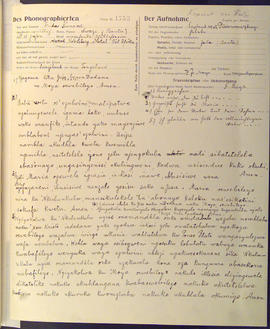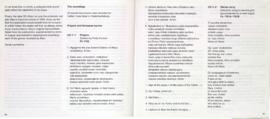[Source - Chloe Rushovich for FHYA, 2018, using the CD booklet “Series 10 The Collection of Father Franz Mayr: Zulu Recordings 1908” and information provided by Gerda Lechleitner via email correspondence in 2016: The wide range of informants recorded by Mayr included young schoolgirls, an old "traditional" healer, non-Christian Zulu people, and Zulus who had already accepted Christianity and European customs (at least formally)
Mayr’s recordings were originally made with an Edison recorder on wax cylinders. This collection originally comprised of 50 recordings made by Mayr. However, the recordings listed in the first catalogue of the collection as Ph 1795A, Ph 1799A-1799B, and Ph 1800, no longer exist. Although these phonograms are missing from the Phonogrammarchiv, their original documentation still exists.
A book about Mayr, written by Clemens Gütl (Gütl, Clemens. ‘Adieu ihr lieben Schwarzen’: Gesammelte Schriften des Tiroler Afrikamissionare Franz Mayr (1865-1914). Vienna: Böhlau Verlag, 2004), prompted the Phonogrammarchiv to publish the Franz Mayr Collection in 2006.
Mayr’s original notes regarding the recordings were sporadic – in some cases he gave very few details about the interlocutor, while in other cases he was quite meticulous. In the case of interlocutors without a first or family name, or interlocutors with isiZulu names, this usually meant that the interlocutor had not converted to Christianity, where European-style names indicated an interlocutor who had converted to Christianity. Mayr had a wide range of interlocutors from the Natal area. Mayr stated that, with the exception of Ph 1773 [CD 2: 23] and Ph 1775 [CD 2: 24], which contain recordings in isiBhaca, considered by Mayr to be a dialect of siSwati, the recordings all document samples of isiZulu. Lechleitner notes that one should be cautious of sociohistorical context when approaching Mayr’s protocols. Importantly, modern research shows that the isiZulu spoken in Natal during Mayr’s stay was a specific dialect called the ‘Lala dialect’ or the ‘Tekeza language’.
The Mayr protocols are published on a data CD as digital images. They are divided into a protocol header and a free text section. The header contains standardised information such as: personal data of the phonographee, location and date of the recording, a brief summary of contents, technical details, as well as the phonographer’s name (and profession). The free text section contains texts, sometimes also translations and musical notations. Among these there may also be transliterations, unpublished or already published elsewhere, sometimes in historical transcriptions. Occasionally, one will also find texts which have not been recorded (e.g. additional verses of songs).
The series is arranged in 2 subseries for Disc 1 and Disc 2, and further laid out so that each song and the associated original protocols, transcriptions, and accompanying booklet is housed in a separate file.]

![Hymn Descants, sung by the same girls [as in Ph 1761; accompanied by a reed organ], handwritten p...](/uploads/r/austrian-academy-of-sciences-oaw/8/1/1/8111917636b3bb54fd93a460b591fcb288311d5399aaf993b962760cda167dea/OAW_Mayr_1908_The_Collection_of_Father_Franz_Mayr_Zulu_Recordings_handwritten_protocol_Ph_1762A-1762B_142.jpg)
![Hymn Descants, sung by the same girls [as in Ph 1761; accompanied by a reed organ], lyrics trans...](/uploads/r/austrian-academy-of-sciences-oaw/e/e/a/eea3ee4f9298e31b4a3dc1cea8384e31bad13b0c0c6991767a5a5447ce18cee4/OAW_Mayr_1908_The_Collection_of_Father_Franz_Mayr_Zulu_Recordings_lyrics_transcript_and_translation_Ph_1762A-1762B_p42_142.jpg)
![Marian song: Descants, sung by several girls [accompanied by a reed organ], lyrics transcript and...](/uploads/r/austrian-academy-of-sciences-oaw/0/0/e/00e506d03cd1032f5712d9753bf078408cad22c156dbc3ca3e37caaef5a5ee50/OAW_Mayr_1908_The_Collection_of_Father_Franz_Mayr_Zulu_Recordings_lyrics_transcript_and_translation_Ph_1761A-1761B_p41_142.jpg)


![Marian song: Descants, sung by several girls [accompanied by a reed organ], handwritten protocol](/uploads/r/austrian-academy-of-sciences-oaw/4/e/0/4e07249b9dff709f4a6cd903fd7b2975dcf8316b80a028e353be92b11ffb4f41/OAW_Mayr_1908_The_Collection_of_Father_Franz_Mayr_Zulu_Recordings_handwritten_protocol_Ph_1761A-1761B_142.jpg)
![Hymn Descants, sung by the same girls [as in Ph 1761; accompanied by a reed organ], music notation](/uploads/r/austrian-academy-of-sciences-oaw/b/1/d/b1d25828814813b710a99f442a3b6df1eeed3d303cdfee5e04d710f84565fa8b/OAW_Mayr_1908_The_Collection_of_Father_Franz_Mayr_Zulu_Recordings_music_notation_Ph_1762A-1762B_142.jpg)
![Umququmbelo: dance song [of the Christian Zulus] Three-part singing by four grown-up girls, handw...](/uploads/r/austrian-academy-of-sciences-oaw/9/3/6/936885cff378b32d1fcc17b8b9dafbf8103bf93bc5547acd74398f2ab85cdfd3/OAW_Mayr_1908_The_Collection_of_Father_Franz_Mayr_Zulu_Recordings_handwritten_protocol_Ph_1754r_142.jpg)
![Umququmbelo: dance song [of the Christian Zulus] Three-part singing by four grown-up girls, lyric...](/uploads/r/austrian-academy-of-sciences-oaw/e/e/a/eea3ee4f9298e31b4a3dc1cea8384e31bad13b0c0c6991767a5a5447ce18cee4/OAW_Mayr_1908_The_Collection_of_Father_Franz_Mayr_Zulu_Recordings_lyrics_transcript_and_translation_Ph_1754_p42_142.jpg)